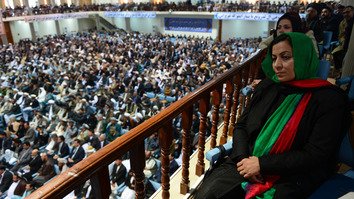KABUL -- Afghan citizens are set to consult with the government in an upcoming consultative Loya Jirga, providing their input on ending the 17-year-old war and ensure lasting peace.
President Ashraf Ghani in a decree Monday (March 11) appointed Mohammad Umer Daudzai, his special representative for regional affairs for consensus on peace and the head of the High Peace Council (HPC) secretariat, to lead a commission responsible for convening the consultative jirga.
The jirga, initially scheduled to be held from March 17-20 in Kabul, was postponed to April 29, according to the decree.
"The main goal of the consultative Loya Jirga for peace is to create a national consensus and understanding and engage Afghans in the peace process so that the government proceeds with peace negotiations based on public advice and decisions," Ehsan Taheri, a spokesperson for the HPC, told Salaam Times.
![Mohammad Umer Daudzai, President Ashraf Ghani's special representative for regional affairs for consensus on peace and chief of the High Peace Council (HPC) secretariat, discusses women's participation in the consultative Loya Jirga with representatives from the Women's Advocacy Committee in Kabul on March 12. [High Peace Council/Facebook]](/cnmi_st/images/2019/03/13/17111-daudzai-585_329.jpg)
Mohammad Umer Daudzai, President Ashraf Ghani's special representative for regional affairs for consensus on peace and chief of the High Peace Council (HPC) secretariat, discusses women's participation in the consultative Loya Jirga with representatives from the Women's Advocacy Committee in Kabul on March 12. [High Peace Council/Facebook]
Participants of this jirga will help determine limits for the delegation on who will negotiate with the Taliban on behalf of the government, he said, adding that the government then will enter negotiations with the Taliban based on this authority.
"This jirga is different from the previous ones," Taheri said. "The government is not selecting the participants of this jirga, but residents of every district will send their representatives to the peace jirga through an election-like process, so that they can present their demands and views at the jirga."
"In Kabul, civil society activists, lawyers, women, journalists and athletes will also elect their representatives to participate in the jirga," he said.
More than 2,000 Afghans from all over the country will take part in the jirga and they will "provide advice and recommendations to the government on how to carry out peace talks with the Taliban", he added.
Limited preparation time, rains and floods in some provinces and overall harsh weather conditions caused a delay in convening the jirga, said Taheri.
"For the first time in Afghan history, women will make up more than 30% of a consultative Loya Jirga," Taheri noted.
"Women's participation in the peace jirga signifies their role in the peace process," and their participation "will prevent any hidden deal during the peace talks with the Taliban that is intended to disregard the rights and achievements of women", Sharifa Arian, 21, a Kabul resident and student at a private university, told Salaam Times.
A unified voice
Afghans and the government are counting on the jirga to help negotiators speak with a unified voice for society and score a breakthrough that can create a path for an end to the conflict.
"The Loya Jirga has a historic background in Afghanistan -- Afghans have settled their conflicts and internal issues through jirgas," Kabul University lecturer Musa Fariwar told Salaam Times.
"There is hope that the national consultative peace jirga will be able to ensure peace and an end to the war in our country," he said.
"All Afghans including the government, political parties, women, civil society activists and youth are calling with one voice for peace," Fariwar added.
"This is why we welcome the consultative peace jirga. We hope that this jirga will be able to determine a roadmap for the peace talks and propose a logical political solution that all parties to this conflict will respect," he said.
Afghan citizens called on the Taliban to take heed of the country's will expressed through the Loya Jirga.
"Our people have been really tired of war, suicide attacks and blasts, and we support any jirga or dialogue that can lead to peace and stability and an end to the war," Muzammel Habibi, 24, a Kabul resident and pharmacy student at one of Kabul's private universities, told Salaam Times.
"I also call upon the Taliban to take part at the peace Loya Jirga and speak face to face with the government's and the people's representatives so that we reach a solution to end the years-long war in the country."
'A positive step to ensure peace'
For Moqadam Amin, a Kabul-based political analyst, the jirga could "open the door for an intra-Afghan dialogue".
"It is said that the government's and people's representatives will take part in the peace jirga," Amin told Salaam Times.
"In my view, neither the government nor any other group can impose its demands on participants of this jirga," he said. "In the current situation, the peace jirga is the best choice to break this deadlock and put an end to the Afghan crisis, and I consider the Loya Jirga a positive step to ensure peace."
Sayed Safiullah Hashemi, a representative from Samangan Province in the Meshrano Jirga (upper house of parliament), shares that sentiment.
"This jirga concerns how to carry out negotiations with the Taliban, and thus it could be a landmark opportunity for the people and the Taliban," he told Salaam Times.
"The Afghans who will participate in this jirga will define the red lines for the Taliban, the government and the international community," said Hashemi. "They are going to make sure that no one party crosses these lines, which are the achievements of the past 20 years."

![About 2,500 Afghan tribal chieftains, community elders and politicians gather in Kabul for the nation's previous consultative Loya Jirga on November 21, 2013, to debate the Bilateral Security Agreement (BSA) with the United States. [Massoud Hossaini/AFP]](/cnmi_st/images/2019/03/13/17097-68041-585_329.jpg)





